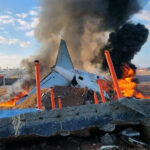The plight of Afghan refugees in Iran and Pakistan is a persistent humanitarian crisis that has been met with global silence. These hardships, which represent a blatant violation of international human rights laws, not only threaten the lives of Afghan refugees but also undermine regional stability. Both Iran and Pakistan continue to subject Afghan refugees to inhumane treatment, including physical abuse, deprivation of economic and social rights, and forced deportations. Despite the clear conflict of these actions with international principles and human rights standards, global institutions and human rights organizations have yet to take effective measures.
In Iran, the condition of Afghan refugees is alarming. Afghan refugees are frequently detained, mistreated, and, in some cases, even denied the right to life by Iranian border forces. This country consistently violates international humanitarian agreements, disregarding the fundamental rights of Afghan refugees. Refugees face severe economic hardships and discrimination, further worsening their living conditions. Meanwhile, Pakistan is no less complicit in the mistreatment of Afghan refugees. Systematic harassment by law enforcement, unlawful detentions, and forced expulsions of Afghan refugees are common practices that contravene international laws.
The silence of the international community, including the United Nations, has exacerbated the challenges faced by Afghan refugees. International organizations, particularly the United Nations High Commissioner for Refugees (UNHCR), must take decisive and practical steps to address this issue. Protecting the rights of Afghan refugees is not only a moral obligation for international bodies but also essential for global security and stability. The lack of robust action by global institutions not only questions the value of human rights but also sets a dangerous precedent for other nations.
Both Iran and Pakistan are signatories to international human rights conventions, yet their actions starkly contradict their commitments. Safeguarding the rights of refugees is a fundamental component of international law, obligating every nation to ensure refugees’ basic rights to life, work, and education. The global community’s negligence has only compounded the plight of Afghan refugees. If these countries are allowed to continue their inhumane practices, it will result in significant harm, not only to Afghan refugees but also to the collective conscience of humanity.
It is imperative that the international community, particularly the UNHCR and human rights organizations, intensify pressure to halt the suffering of Afghan refugees. The global community must urge Iran and Pakistan to adhere to international human rights standards and honor their commitments by treating Afghan refugees with dignity and humanity. Allowing this crisis to persist will not only destabilize the region but also erode the universal values of human rights.
The plight of Afghan refugees is a profound test for global solidarity. The international community must raise its voice against these injustices and increase pressure on both countries to cease their mistreatment of Afghan refugees. The time has come for collective action to uphold human rights and secure a safe and dignified life for Afghan refugees.













